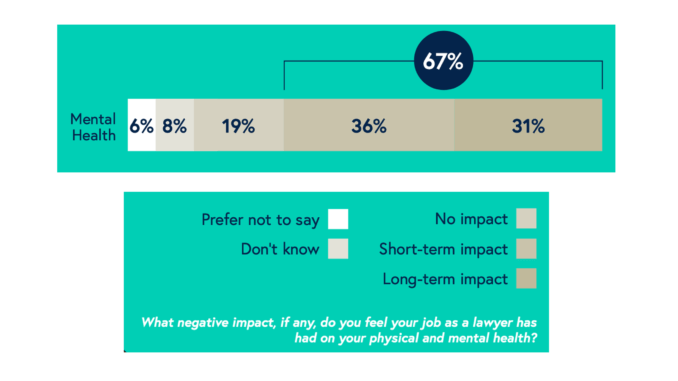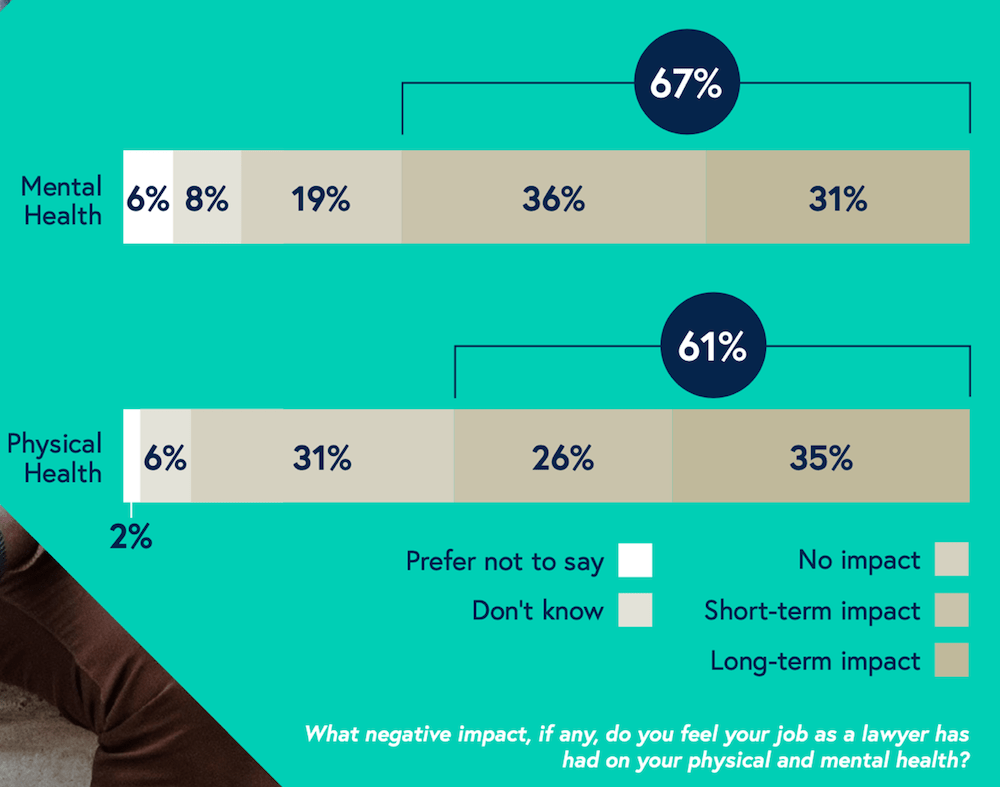
A new survey by transaction management platform Legatics and YouGov, has found that two-thirds of lawyers (67%) reported that their jobs have had a negative impact on their mental health, over either the short- or long-term.
In comparison, the US Government’s CDC estimates that among the general population, one in five people ‘will experience a mental illness in a given year’.
The same sample of 100 lawyers in the UK also suffered from bad physical health because of their jobs (61%) over the short- or long-term. While 90% reported some form of stress or burnout, again directly related to their jobs as lawyers.

To make matters worse, less than a quarter of lawyers surveyed felt that there was support for them on these essential issues.
Unsurprisingly for the commercial legal sector, one of the main causes was excessive work, but this was also connected to other issues, such as dissatisfaction with one’s job.
The survey found that the other most important factors for dissatisfaction were a lack of recognition by managers for one’s work and a lack of team support.
Interestingly – and perhaps paradoxically – the survey sample said that ‘mundane work’ was not in itself a major cause of dissatisfaction, yet the data also showed ‘automating administrative work is considered by lawyers to be the most impactful way that technology could help’ with the overall burden.
That seems to suggest that process work in itself is not a key cause of stress and burnout – but perhaps the total quantity of work is, whether that is complex, high value work, or lower risk routine work. And that makes sense. Not everyone in legal services wants to handle high risk, high value matters – or in fact finds that is what fills their days as a lawyer.
I.e. although we can get into a lot of sophistication around the causes of stress and burnout, a key reason for this – at least for some people – is simply that humans are not machines and we are not made to constantly work. Moreover, as lawyers have ‘to get it right’ (whether the matter is simple or complex) and in many law firms have to be super-available (with WFH sometimes making this even worse), the overburdening through sheer work volume is central here.
It’s very possible that doing more interesting work can keep you feeling better for longer, but once again, we are all only human, and even stimulating work in huge volumes will eventually have an impact.
This site would add that there will be other factors, e.g. unpleasant and unrealistic managers and clients, who appear to have zero empathy or interest in your well-being. I.e. we need to consider that burnout is not something that happens in isolation. It’s not ‘an accident’. There is an organisational and work culture cause for this in many cases.
You don’t just wake up one morning and go: ‘Whoops, I seem to be totally exhausted and burnt out. How did that happen?’ The environment around you has led to that. And that environment is managed, owned, and fed into by many different people and stakeholders.
For example, Artificial Lawyer was talking to a former lawyer recently who told the story of how they left the profession. They worked at what appeared to be a generalist commercial law firm with a good work/life balance, but their department was focused on transactions – so, unlike some other parts of the firm they generally worked longer hours, as that was considered ‘normal’ for the firm’s deal work.
That wasn’t great, but it was not the final straw. The problem was the fact that the firm seemed incapable of saying no to the demands of the clients. The former lawyer gave one instance of a High Net Worth client who called on a Friday to dump a new piece of work on the team. They said they were off on a short holiday and wanted a major project wrapped up by Monday. So, for the team no weekend once again, no rest, no meaningful time with the family, and no time to recharge before going right back into another week of work. This scenario happened a lot and it got old very quickly.
Key to this situation was the fact that the firm felt it could not say no to the client, as they knew the client would just say: ‘If you won’t do it, then another law firm will.’ So, nothing changed.
And for Artificial Lawyer this is the central issue. It’s the overall culture of commercial law that leads to this situation. One could say the sector has walked down something of a blind alley when it comes to work/life balance and many within this world don’t know how to fix it. The end result is that plenty of very talented people leave their firms, or the profession as a whole, when if the environment had been just a bit more flexible and understanding of stress and burnout, the firms would have retained that talent.
This then raises the next point: who stays behind? Now, that’s a subject outside the scope of the survey, but if you end up with a kind of ‘Well, it didn’t do me any harm, so I will now do the same to you,’ attitude from those who eventually stick it out and then become managers themselves, then we just perpetuate the cycle. And of course, the idea that ‘it didn’t do me any harm’ is perhaps true for some, but others are possibly nursing serious issues that they have suppressed in order to keep working like that. In turn, the junior lawyers are going to be on the receiving end of that manager’s unaddressed issues. And so it goes.
In short, someone, somehow needs to break the cycle.
And people wonder why so many lawyers want to leave to go inhouse, or set up their own small firms, or just leave the sector entirely. Yet the problems are in front of our faces…..
Any road, there is some hope, because more and more people are talking about it, there are also increasing efforts being made to address these issues and provide support, as well as come up with new ways of working.
Anthony Seale, CEO of Legatics, commented: ‘This survey confirms the scale of the talent retention problem in the legal profession, and highlights many of the problems my team and I saw as lawyers, such as overtime, lack of support, and mental health challenges, which all tend to culminate in burnout or even someone leaving the profession.
‘Tackling these challenges is more important than ever. The pandemic has turned many people’s priorities around completely and changed our approach to work irreversibly. People are questioning what’s most important to them, and what they will and won’t put up with, and employers across all sectors are making changes to adapt in response.’
Meanwhile, Lucy Shurwood, a partner at Pinsent Masons, who is a founding member of the Mindful Business Charter – a practical framework which aims to combat stress and burnout – said: ‘As this report highlights, many lawyers continue to be affected by stress and burnout, but the days of accepting that stress and burnout are part of the job are gone, with firms taking proactive steps to support the wellbeing and mental health of their people.
‘At Pinsent Masons we’ve worked hard to collaborate with clients to embed the principles of the Mindful Business Charter – an initiative we founded alongside Barclays and Addleshaw Goddard to encourage businesses to commit to making changes that support the mental health and wellbeing of employees and eradicate negative working practices.’
So, there is hope, but it is still very early days.
—
Legatics Webinar
If you found that this subject resonated with you, or you are a law student and wondering what you are letting yourself in for, then come along to the free Legatics webinar on 26 May, 9.30AM BST, chaired by Richard Tromans, founder of Artificial Lawyer, with special guest speakers, Lucy Shurwood, Partner for Pinsent Masons and Chrissie Wolfe, founder of Law and Broader, plus the Legatics team, to discuss the findings of the research and explore solutions to the challenges.
